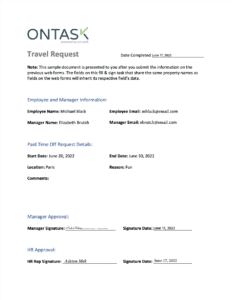Working in the education field, it’s likely you’ve heard your fair share about FERPA compliance. FERPA, the Family Educational Rights and Privacy Act, is a federal law which mandates the way that educational institutions handle sensitive student information. Another term you may have heard recently related to the law is: “FERPA forms”. So, what exactly is a FERPA form? Here’s everything you need to know.
What is a FERPA form?
Simply put, a FERPA form is any form that parents or students use to request student information, forms signed by teachers stating their understanding, or even FERPA authorizations in which students permit schools to share their information with third parties. These forms can be both paper-based or electronic. Digital FERPA forms have gained popularity in recent years due to their ease of use and heightened security protocols, so don’t be surprised if the next FERPA form you see is electronic.
Not sure the difference between FERPA and HIPAA? Read our blog to find out!
FERPA Consent Forms
One of the most common types of FERPA consent forms used at universities and higher learning facilities are known as. These consent forms are signed by students, allowing the university to share student record information with parents or legal guardians. So long as a student is over 18, they have to explicitly give their permission before this information can be shared.
FERPA Waiver Forms
When applying for colleges, students will often fill out what is known as a FERPA waiver form. These are important when students are sending letters of recommendation during the application process. In this case, it releases the admissions team to view letters of recommendation without the student viewing them, solidifying that they are true and accurate.
Are digital FERPA forms legally binding?
FERPA law was updated in 2004 to account for digital instances of signed written consent, allowing these documents to become legally binding using eSignatures. There are two conditions that must be met in order for these signatures to be valid. First, the educational institution must be sure the right user is signing the document. Second, the form must clearly state that the student, or in some cases the parent, approves of all content on the form.
When are FERPA consent forms important?
Save for a few exceptions, officials at schools and universities must collect signed FERPA consent forms before sharing any data from student records with third parties. It’s important to note that sharing of student information between school employees with a “legitimate educational interest” is permitted, so long as the information is pertinent to the student educational journey. When third party information becomes involved, signed consent is typically required under FERPA guidelines.
When does authorization transfer from parent to student?
While FERPA aims to protect the rights of students, parents and legal guardians control written consent for the student for children under the age of 18 who are not in college.
When students turn 18 years of age or enroll in college, FERPA consent is then transferred to them. It is important to note that once the student becomes eligible under FERPA law, parents no longer have access to student records. However, the student can provide written consent which allows their parents to their educational records if they so choose.
Why are so many schools turning to digital FERPA forms?
Paper-based forms have been around for as long as we can remember, but are starting to become outdated with the onset of digital technology. Not only are FERPA forms easier to track, they are also a more secure way to protect student data. Solutions such as Docubee feature security features like authentication tokens, encryption in transit, and the ability to split and designate access to authorized users to make staying in compliance a no-brainer.
See how easy collecting FERPA forms is with Docubee today. Start your 14-day free trial.

















